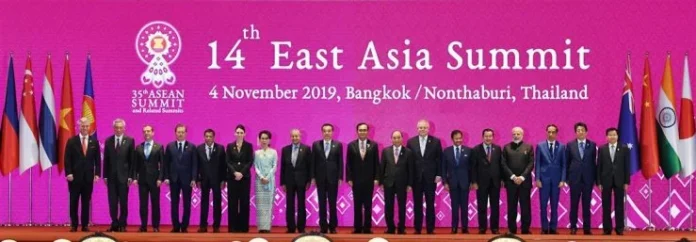New Delhi: The Indo-Pacific Oceans initiative announced by Prime Minister Narendra Modi at the Bangkok East Asia Summit (EAS) on November 4 included a key proposal on maritime security pillar that would foster rules-based international order in the region.
Modi proposed to launch a maritime security pillar at the East Asia Maritime Security workshop, which India will host together with Australia and Indonesia in February 2020, to help realise the country’s vision for the region, sources said.
The Prime Minister had described the grouping as the logical platform to promote a free, open, inclusive, transparent, rules-based, peaceful, prosperous Indo-Pacific region, where sovereignty and territorial integrity and the application of international law, especially the United Nations Convention for the Law of the Sea (UNCLOS) are assured to all states equally.
“It should be a space in which freedom of navigation, overflight, sustainable development, protection of the ecology especially the marine environment, and an open, free, fair and mutually-beneficial trade and investment system are guaranteed to all,” Modi is u.nderstood to have said in his remarks.
The Prime Minister proposed a cooperative effort to translate principles for the Indo-Pacific into measures to secure a shared maritime environment and suggested an Indo-Pacific Oceans Initiative, which could be described as an action plan under India’s Indo-Pacific vision.
“We should recognise the imperative for all states in the regions with interests in it, to work collaboratively to safeguard the oceans including from plastic litter; enhance maritime security; preserve marine resources; build capacity and fairly share resources; reduce disaster risk; enhance science, technology and academic cooperation; and promote free, fair and mutually beneficial trade and maritime transport,” Modi said.
“Work in each sector could be led by one or two countries, with partners joining one or more area of interest. This would help governments align better with public opinion demanding cooperative solutions to global challenges. The initiative would be truly open, inclusive and cooperative. And it can develop institutional roots as partners wish, step-by-step,” he said.
Modi suggested that India start on the maritime security pillar, as well as disaster-risk reduction, either in the lead or partnering any other interested state. “As we will host—with Australia (and Indonesia)–the Fourth EAS Maritime Security Workshop next February, we can begin work on the security pillar from that date,” he said.
At the EAS, Modi also described terrorism as the most egregious of cross-border crimes, especially when aided, abetted, armed and financed by states. “It remains the most glaring example of our world’s failure to arrest a painful cancer that affects every region of our planet today,” he said.





